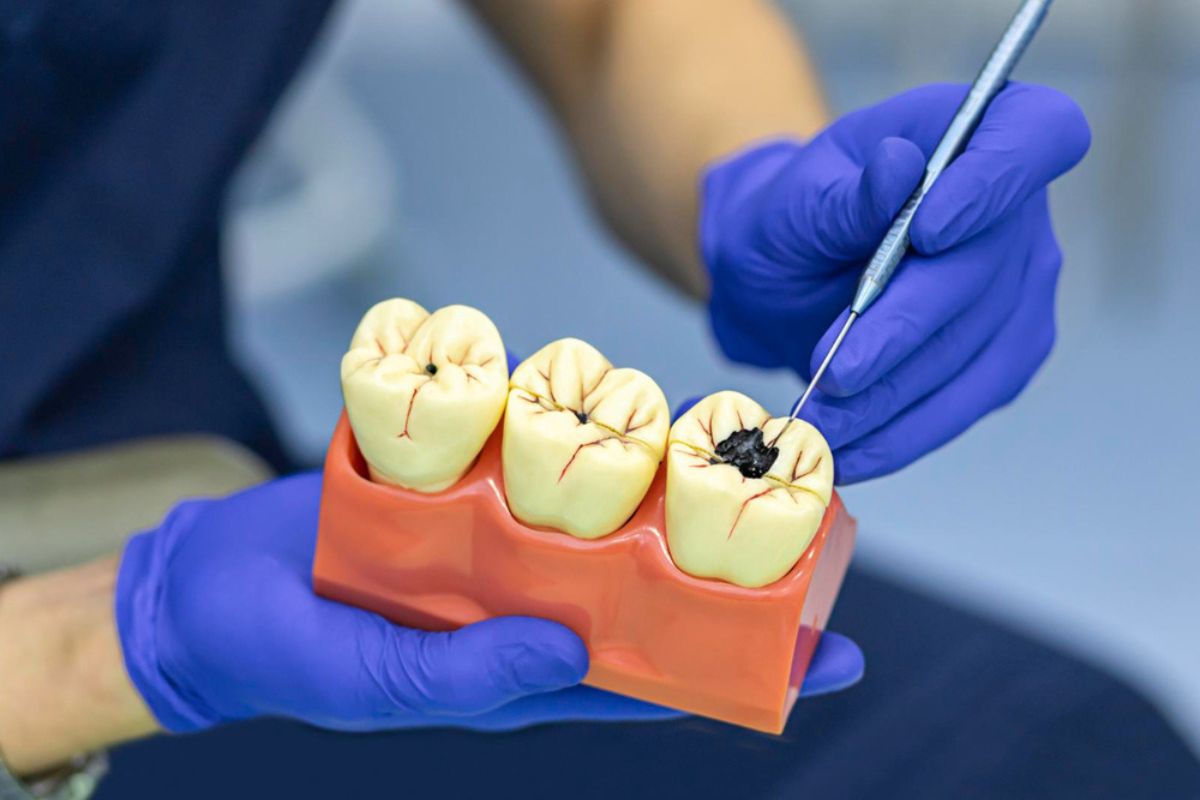
Dental caries, commonly known as cavities, are tiny holes in teeth caused by decay. They’re a widespread issue affecting people of all ages. But what exactly causes these pesky cavities? Bacteria in your mouth, sugary foods, and poor oral hygiene play significant roles. When bacteria feast on sugars, they produce acids that erode tooth enamel. Over time, this leads to cavities. Regular brushing, flossing, and dental check-ups can help prevent them. But did you know that even your diet and genetics can influence your risk? In this post, we’ll uncover 40 intriguing facts about dental caries, shedding light on prevention, treatment, and more.
Key Takeaways:
- Dental caries, or cavities, are common and preventable. Good oral hygiene, regular dental check-ups, and a healthy diet can help keep your teeth strong and cavity-free.
- Untreated cavities can lead to serious health issues. They can impact overall health, including heart health, diabetes management, and even mental well-being. Regular dental care is essential for a healthy body and mind.
What are Dental Caries?
Dental caries, commonly known as cavities, are a widespread oral health issue. They occur when tooth enamel is damaged by acids produced by bacteria in the mouth. Here are some intriguing facts about dental caries:
-
Dental caries are the most common chronic disease in children and adults. They affect people of all ages, making them a significant public health concern.
-
Cavities form when bacteria in the mouth convert sugars into acids. These acids then erode the tooth enamel, leading to decay.
-
Fluoride can help prevent dental caries. It strengthens tooth enamel, making it more resistant to acid attacks.
-
Saliva plays a crucial role in preventing cavities. It helps wash away food particles and neutralizes acids produced by bacteria.
-
Dental caries can be painless in the early stages. Often, people don't realize they have a cavity until it becomes more severe.
Causes of Dental Caries
Understanding what causes dental caries can help in preventing them. Here are some key factors:
-
Poor oral hygiene is a leading cause of dental caries. Not brushing and flossing regularly allows plaque to build up on teeth.
-
Frequent consumption of sugary and acidic foods and drinks increases the risk. These substances provide fuel for bacteria to produce harmful acids.
-
Dry mouth can contribute to the development of cavities. Without enough saliva, the mouth can't effectively neutralize acids or wash away food particles.
-
Certain medical conditions and medications can increase the risk. For example, diabetes and some medications that reduce saliva flow can make one more prone to cavities.
-
Genetics can play a role in susceptibility to dental caries. Some people may naturally have weaker enamel or more cavity-prone teeth.
Symptoms of Dental Caries
Recognizing the symptoms of dental caries early can lead to prompt treatment. Here are some signs to watch for:
-
Toothache or spontaneous pain is a common symptom. This can occur without any apparent cause.
-
Tooth sensitivity to hot, cold, or sweet foods and drinks. This sensitivity can indicate enamel erosion.
-
Visible holes or pits in the teeth. These are clear signs of advanced dental caries.
-
Brown, black, or white staining on the surface of a tooth. These discolorations can signal decay.
-
Pain when biting down. This can indicate that the decay has progressed to affect the deeper layers of the tooth.
Prevention of Dental Caries
Preventing dental caries involves a combination of good oral hygiene practices and lifestyle choices. Here are some effective strategies:
-
Brush your teeth at least twice a day with fluoride toothpaste. This helps remove plaque and strengthens enamel.
-
Floss daily to remove plaque and food particles between teeth. Flossing reaches areas that brushing alone can't.
-
Limit sugary and acidic foods and drinks. Reducing these in your diet can decrease the risk of cavities.
-
Visit your dentist regularly for check-ups and cleanings. Professional cleanings remove plaque and tartar that can't be eliminated by brushing and flossing alone.
-
Consider dental sealants for added protection. Sealants are thin coatings applied to the chewing surfaces of back teeth to prevent decay.
Treatment of Dental Caries
When dental caries occur, various treatments can restore tooth health. Here are some common options:
-
Fluoride treatments can help in the early stages. These treatments can sometimes reverse early decay.
-
Fillings are the most common treatment for cavities. The decayed portion of the tooth is removed and filled with a material like composite resin or amalgam.
-
Crowns may be necessary for more extensive decay. A crown covers the entire tooth, restoring its shape and function.
-
Root canals are required when decay reaches the tooth's pulp. This procedure removes the infected pulp and seals the tooth.
-
Tooth extractions are a last resort. If a tooth is too damaged to be saved, it may need to be removed.
Interesting Facts about Dental Caries
Here are some lesser-known facts that might surprise you:
-
Ancient humans had fewer cavities. Their diets were less sugary and more abrasive, which helped clean their teeth naturally.
-
Chewing sugar-free gum can help prevent cavities. It stimulates saliva production, which helps neutralize acids.
-
Some fruits and vegetables can help clean your teeth. Crunchy produce like apples and carrots can help scrub away plaque.
-
Breastfeeding can reduce the risk of dental caries in infants. It promotes better jaw development and less exposure to sugary liquids.
-
Dental caries can affect pets too. Dogs and cats can also suffer from tooth decay and need regular dental care.
Impact of Dental Caries on Overall Health
Dental caries don't just affect your teeth; they can have broader health implications. Here are some ways they can impact overall health:
-
Untreated cavities can lead to infections. These infections can spread to other parts of the body, causing serious health issues.
-
Poor oral health is linked to heart disease. Bacteria from the mouth can enter the bloodstream and contribute to heart problems.
-
Diabetes and dental caries have a bidirectional relationship. Poor blood sugar control can increase the risk of cavities, and severe dental issues can make diabetes harder to manage.
-
Pregnant women with untreated dental caries are at risk. They may have a higher chance of premature birth and low birth weight babies.
-
Chronic pain from dental caries can affect mental health. Persistent pain can lead to anxiety and depression.
Fun Facts about Dental Caries
Let's end with some fun and quirky facts about dental caries:
-
The first recorded dental filling dates back to 7,500–9,000 years ago. Ancient humans used materials like beeswax to fill cavities.
-
The term "cavity" comes from the Latin word "cavus," meaning hollow. It perfectly describes the hole that forms in a decayed tooth.
-
Some cultures used to believe that tooth worms caused cavities. This myth persisted for centuries before the true cause was understood.
-
The world's largest cavity-fighting campaign was in China. It involved over 1 million children and aimed to reduce the incidence of dental caries.
-
There are over 700 species of bacteria in the human mouth. Only a few of these are responsible for causing dental caries.
Keeping Your Smile Bright
Understanding dental caries helps keep your teeth healthy. Regular brushing, flossing, and dental check-ups are key. Eating less sugar and more nutritious foods also makes a big difference. Remember, fluoride strengthens enamel, so use toothpaste with fluoride.
Cavities can be sneaky, often forming without pain. Early detection is crucial. Sealants provide extra protection, especially for kids. Drinking water, especially fluoridated, helps wash away food particles and bacteria.
Don't forget, your mouth is a gateway to overall health. Poor oral hygiene can lead to other health issues. So, take care of your teeth and gums. It's easier to prevent cavities than to treat them.
Stay informed, stay proactive, and keep smiling. Your teeth will thank you.
Frequently Asked Questions
Was this page helpful?
Our commitment to delivering trustworthy and engaging content is at the heart of what we do. Each fact on our site is contributed by real users like you, bringing a wealth of diverse insights and information. To ensure the highest standards of accuracy and reliability, our dedicated editors meticulously review each submission. This process guarantees that the facts we share are not only fascinating but also credible. Trust in our commitment to quality and authenticity as you explore and learn with us.


